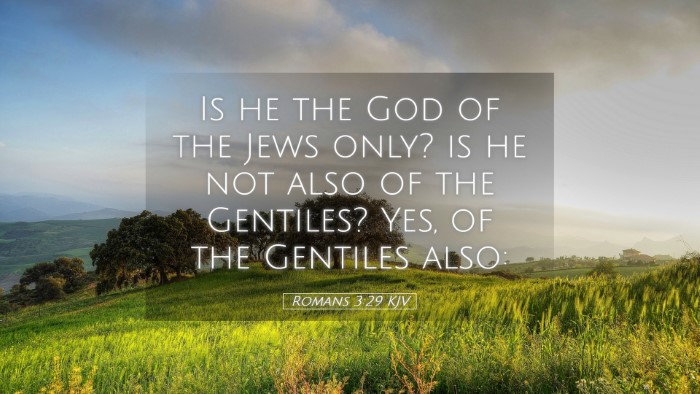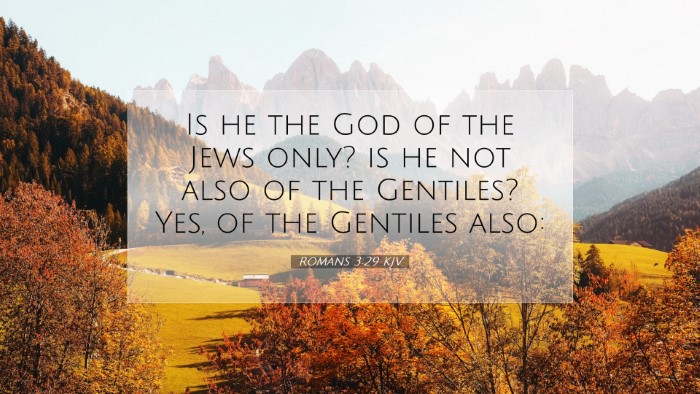Commentary on Romans 3:29
"Is He the God of the Jews only? Is He not also of the Gentiles? Yes, of the Gentiles also."
Introduction
The apostle Paul, in this passage, emphasizes a crucial aspect of God's nature and His inclusive plan of salvation. This verse serves as a pivot in the theological argument constructed throughout the Book of Romans, particularly regarding the status of both Jews and Gentiles in relation to God's grace. Paul defends the universalizability of salvation, a theme prevalent in both the Old and New Testaments.
Contextual Analysis
In the preceding chapters of Romans, Paul has laid the groundwork for explaining how all have sinned and fall short of the glory of God (Romans 3:23). The focus shifts in this verse to address the inclusivity of God’s mercies and the extension of grace beyond the Jewish people.
The God of All
Matthew Henry provides a profound insight on the nature of God as the God of the Jews and the Gentiles. He explains that the covenant made with Israel does not exclude the Gentiles from the benefits of God's grace. This assertion flips the understanding of nationality and religion, showcasing that salvation is not about ethnic lineage but about faith.
Henry further elaborates that understanding God as the God of all emphasizes His sovereignty and love that transcends specific groups. God's character indicates that whether Jew or Gentile, all are entitled to seek and find Him.
Universal Salvation
Albert Barnes notes that this verse underscores the universal nature of the Gospel. He articulates that while the Jews were the chosen people, this choice was not exclusive. God's redemptive plan was always intended for all humanity, as illustrated by the inclusion of the Gentiles through faith.
Barnes emphasizes this point by highlighting that the invitation to salvation through Jesus Christ extends to everyone, reaffirming the core of the Gospel message: it bridges cultural and racial divides.
Faith as the Common Ground
Adam Clarke draws attention to faith being the essential component that connects both Jews and Gentiles. Clarke emphasizes that it is not adherence to the law or cultural rituals that brings salvation but faith in Christ's redemptive work. This places all believers, regardless of their background, on an equal footing before God.
He notes that faith alone is the means by which both groups can access God's grace, furthering the argument that spiritual lineage supersedes physical lineage in the economy of salvation.
Theological Implications
- Equality Before God: This verse challenges any notion of superiority based on ethnicity or religious heritage, asserting that all have equal access to God.
- The Nature of God: It reveals God's character as inclusive and accessible, emphasizing His active desire for relationship with all humanity.
- Great Commission: The affirmation that God is the God of Gentiles compels believers to share the Gospel universally, reflecting the heart of Christ's command to preach to all nations.
Exegesis
In examining the original Greek text, the phrasing underscores both exclusivity in the Jewish context and the new, inclusive reality inaugurated by Christ. Paul’s rhetorical question implicates the necessity of recognizing the full scope of God's salvific purpose.
This not only served to reassure the Gentile converts but also challenged the Jewish believers to reconsider their understanding of the law and grace, encouraging a more universal view of God's family.
Application for Today
In our contemporary context, Romans 3:29 prompts the Church to embrace diversity within the body of Christ. The challenge remains for Christians to reflect God's grace in their interactions across cultural divides. It also calls for a continual examination of the Church's stance on issues of inclusivity and outreach.
Pastors and church leaders can utilize this verse to remind their congregations that the Gospel is meant for all people, and they should actively pursue opportunities for ministry in diverse communities.
Conclusion
In summary, Romans 3:29 offers profound truths about God's character and His redemptive work for humanity. The insights from Matthew Henry, Albert Barnes, and Adam Clarke converge to remind us that the Gospel transcends cultural barriers and invites all to partake in the grace of God through faith. This message is both a comfort and a challenge, urging believers to engage with the world around them, reflecting the inclusive heart of our God.


